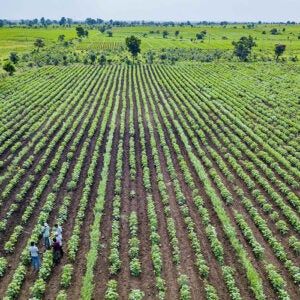
The new Organic Cotton in India project has signed up 10 brands and organisations as part of its goal to build a fair, environmentally friendly and economically viable organic cotton supply chain.
The initiative plans to deliver tangible benefits to at least 12,500 farmers converting to organic farming across India.
The companies signed up to take part in the project are committed to being part of this long-term farmer-focused initiative and include: Brands Fashion, C&A, Esprit, Formesse, GOTS, HAKRO, H&M Group, s.Oliver Group, Tchibo, and Fairtrade. The initiative starts its on-site implementation now and it will run until 2025. It is largely being financed by the 10 companies, however it is also being financially supported by the German Federal Ministry for Economic Cooperation and Development, which is where its co-partner, the Partnership for Sustainable Textiles (PST), is based.
PST, which has around 130 members from companies, associations, trade unions and the German Federal Government, says the ultimate aim is to achieve social, environmental and economic improvements in the ready-made garment sector.
Co-partner and fellow multi-stakeholder organisation Organic Cotton Accelerator (OCA), will share its established Farm Programme to give the participating farmers access to reliable non-GM (genetically modified) seeds, receive capacity building support on organic practices, and will provide long-term procurement commitments as well as better earnings through premiums.
The farmers will receive training on organic agronomic practices through OCA’s Farm Programme, another programme dedicated to promoting decent working conditions will be developed and rolled out to all farmers. The aim is for thousands of hectares of farmland to be regenerated through organic practices, eliminating the use of synthetic fertilisers and pesticides, building long-term soil health, and increasing on-farm biodiversity for generations to come.
OCA, working through local farm groups or implementing partners, plans to support the Partnership Initiative’s brand partners by connecting them to farm projects in various Indian regions. In return, the initiative partners will provide a sourcing commitment for both in-conversion cotton and certified organic cotton, including premiums to farmers (higher than the market price).
The OCA explains this support is welcomed by cotton farmers who want to transition from conventional to organic as the in-conversion process can take up to three years, and comes with challenges such as temporary drops in yield that require extra financial support.
OCA’s executive director Bart Vollaard said: “Progressive targets for organic cotton sourcing are great, yet they need to be combined with tangible support to farmers, in particular those that are transitioning from conventional to organic agriculture. It is great to work with members of the Partnership for Sustainable Textiles who understand that they need to go the extra mile to realise their organic cotton ambitions and provide farmers with long-term commitments and better prices.”
He goes on to explain the initiative helps to mobilise more support to farmers during the challenging phase of transitioning to organic practices and deepen the impact by a special focus on decent working conditions. He said: “This truly helps accelerate organic cotton’s potential for positive impact.”
Jürgen Janssen, head of the secretariat of the Partnership for Sustainable Textiles added: “The new Partnership Initiative has several positive effects; for the farmers, who earn more and receive greater security, for the textile companies and brands, who can purchase more organic cotton, and last but not least for the environment. It is also a good example of successful private-public financing: the companies bear more than three quarters of the costs, while the Federal Ministry for Economic Cooperation and Development finances the rest through two GIZ projects.”



